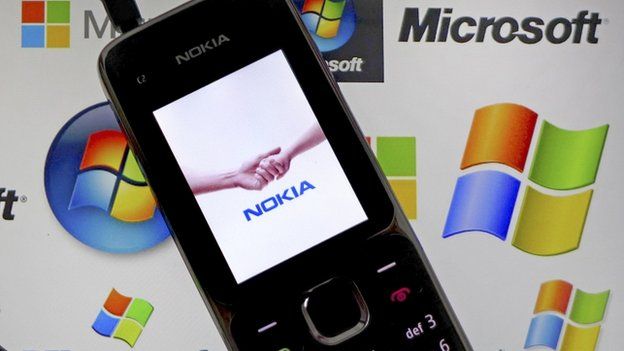
-
8 July 2015
- From the section Business

Microsoft is shedding another 7,800 jobs as it reorganises its Nokia mobile phone unit.
The move represents a massive shift in strategy for Microsoft since it purchased Nokia’s mobile phone business for €5.44bn ($7.5bn; £4.5bn) last year.
Microsoft axed 18,000 jobs from the unit last July – the deepest cuts in the company’s history.
The technology giant will also write down the value of the Nokia deal by $7.6bn.
Microsoft currently has about 118,000 employees worldwide. A statement from the government in Finland, were Nokia is based, said the job losses would include some 2,300 posts in the country.
The statement said the government was “disappointed with Microsoft’s decision” and called a special ministerial meeting to consider assistance for those affected. “Loss of so many jobs is very sad for the whole society and for individuals affected,” it said.
Microsoft said in a statement that it would “restructure the company’s phone hardware business to better focus and align resources”.
Although still strong in the software market for personal computers, the company is faces strong competition in the fight to establish its mobile handset operation. This market is dominated by devices powered by Google’s Android system or Apple’s iOS.
A survey by research firm IDC said Microsoft’s Windows was expected to capture just 3.2% of the global smartphone market this year.
‘Reinvention’
In a memo to staff, the company’s chief executive Satya Nadella said: “I am committed to our first-party devices including phones. However, we need to focus our phone efforts in the near term while driving reinvention.
“We are moving from a strategy to grow a standalone phone business to a strategy to grow and create a vibrant Windows ecosystem that includes our first-party device family.”
Microsoft is due to start rolling out Windows 10 later this month, introducing a new operating system that can be used to power not only personal computers but a range of mobile devices.
Last month, Microsoft announced a shakeup of top management including the departure of Stephen Elop, the former Nokia chief who joined the US tech company as part of the acquisition.
Analysis: Rory Cellan-Jones, BBC technology correspondent
Soon after the former Microsoft executive Stephen Elop became chief executive of Nokia, he wrote a memo to staff warning that the ailing company and its Symbian operating system was on a burning platform.
His solution was to jump on to another platform, the Windows Phone operating system, and eventually to sell the whole business to Microsoft. The alliance of the Windows Phone software with the Nokia hardware was supposed to create a powerful third force in the smartphone market, providing consumers with an attractive alternative to Android and Apple phones.
But now this platform too is burning, and Microsoft’s $7.3bn investment in Nokia along with its smartphone has gone up in flames. Stephen Elop has already left and now nearly 8,000 employees, many of them former Nokia staff, will follow him out of the business.
Microsoft says it will now change direction, creating an “ecosystem” which will see Windows phones built by other manufacturers alongside its own handsets.
The company which dominated the desktop computer era has never been a major force in mobile computing. Microsoft describes itself as “the leading platform and productivity company for the mobile-first, cloud-first world” – but that platform still needs some work.
